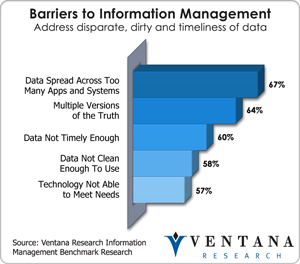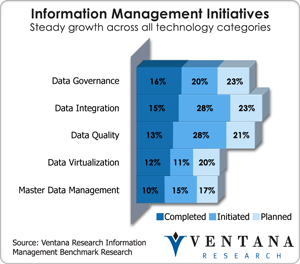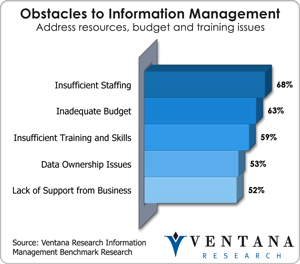Our recent benchmark research on information management uncovered some startling facts about the level of technology adoption necessary for efficient information-centric organizations. Chief information officers (CIO) are responsible for the availability of information to their businesses in a consistent and timely basis, but in most organizations, information management is seen as just a delegated set of tasks and is not the CIO’s top priority. This unfortunate outlook can have a lasting impact on the efficiency and profitability of a business.
Our business analytics benchmark of more than 2,800 organizations found that two-thirds spend the majority of their time on data-related tasks rather than analytic ones. Analysts spend too much time using tools such as Microsoft Excel to copy and paste the data they need to communicate to meet information requests. Lack of availability and lack of consistency in a company’s information has a severe negative impact on its business analytics.
Our benchmark research on information management found some opportunities for businesses to gain ground. Almost two-thirds (63%) have confidence in their organizations, saying they have the right team to improve information availability, but at the same time they admit that data spread across too many applications and systems (67%) and multiple versions of the truth (64%) are barriers to information management. Getting the right accurate information still plagues most organizations, and most do not have a plan to improve this situation. While organizations have complained for decades about lack of access or accuracy of the data, today the impact of these issues is better known. Only 19 percent of organizations indicate business and IT work well together, while 56 percent say they work fairly well together and are focused on improving. Most organizations still operate in silos and talk about working together more than they actually do.
businesses to gain ground. Almost two-thirds (63%) have confidence in their organizations, saying they have the right team to improve information availability, but at the same time they admit that data spread across too many applications and systems (67%) and multiple versions of the truth (64%) are barriers to information management. Getting the right accurate information still plagues most organizations, and most do not have a plan to improve this situation. While organizations have complained for decades about lack of access or accuracy of the data, today the impact of these issues is better known. Only 19 percent of organizations indicate business and IT work well together, while 56 percent say they work fairly well together and are focused on improving. Most organizations still operate in silos and talk about working together more than they actually do.
 Our research found a lack of adoption of key initiatives to help manage information assets more effectively. Even key initiatives that are completed, from master data management (MDM) (10%) to data virtualization, data quality, data integration and data governance (16%) are employed by just a fraction of organizations that should be mastering the science of information management. We saw some potential for improvement; initiatives in data integration and data quality are in effect at 28 percent of organizations, but in other areas the number was smaller. The majority of initiatives focus on customer-centric data: The number ranges from almost three-quarters of some organizations to much less in financial, employee, product and supplier data. These data-related initiatives are critical for organizations that need to deliver information management. An organization that does not have them completed and working together is taking significant business and financial risk by running at an unacceptably low level of efficiency and accuracy.
Our research found a lack of adoption of key initiatives to help manage information assets more effectively. Even key initiatives that are completed, from master data management (MDM) (10%) to data virtualization, data quality, data integration and data governance (16%) are employed by just a fraction of organizations that should be mastering the science of information management. We saw some potential for improvement; initiatives in data integration and data quality are in effect at 28 percent of organizations, but in other areas the number was smaller. The majority of initiatives focus on customer-centric data: The number ranges from almost three-quarters of some organizations to much less in financial, employee, product and supplier data. These data-related initiatives are critical for organizations that need to deliver information management. An organization that does not have them completed and working together is taking significant business and financial risk by running at an unacceptably low level of efficiency and accuracy.
Information management in a distributed enterprise environment is no easy task when you need a common information warehouse. We found that too many incompatible tools (57%) and many unsynchronized metadata stores (42%) were the top two obstacles to having a common information warehouse.
IT management puts itself in a difficult situation when it fails to invest in resources and technology to improve information asset management. While projects are being initiated and planned, in many cases data availability is not being improved fast enough to meet business needs. We found the largest obstacles were insufficient staffing (68%), inadequate budget (63%) and insufficient training and skills (59%), which means that many organizations are ignoring this issue or operating with less than skilled resources that are already overstretched.
and technology to improve information asset management. While projects are being initiated and planned, in many cases data availability is not being improved fast enough to meet business needs. We found the largest obstacles were insufficient staffing (68%), inadequate budget (63%) and insufficient training and skills (59%), which means that many organizations are ignoring this issue or operating with less than skilled resources that are already overstretched.
This has to change, and our benchmark found a lot of potential places for improvement. CIOs need to create a strategic plan for information management to ensure they are focused on the factors necessary to equip their information architecture to meet business needs. Unfortunately, even as organizations begin to see the importance of information management, we have the current fixation on handling big data, which takes away resources that could be devoted to getting information management efforts in order. The reality is that big data does not operate efficiently without an efficient information management environment. Just adding another data source that is not well-integrated inevitably increases costs and uses more resources.
Your next step should be to make information management a strategic top agenda item for your CIO. Other priorities, including business analytics, business applications and big data, will not reach their full potential without top-notch information management that integrates business and IT efforts.
Regards,
Mark Smith
CEO & Chief Research Officer














